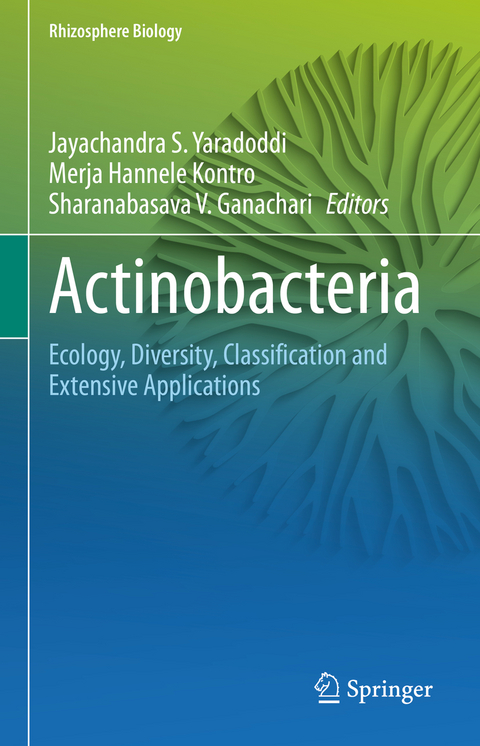
Actinobacteria
Springer Verlag, Singapore
978-981-16-3352-2 (ISBN)
Through this book, the readers will learn about the different aspects of Actinobacteria- beginning with its ecology and occurrence, to the ways of its adaptation to harsh climates, and finally to its practical applications. The book also presents methods of identifying and characterizing this diverse group of bacteria through advanced techniques like MALDI-TOF, 16S rRNA analysis, etc. Different chapters describe the various biotechnological applications of Actinobacteria, including bioremediation, secondary metabolite production, and in producing antibiotics, anti-cancer therapeutics. It also provides insights into the applications in agriculture and forestry by inhibiting plant pathogenic bacteria's growth.
Dr. Jayachandra S. Yaradoddi is a Research Scientist in Biomaterials Laboratory, Dept. of Center for Materials Science, KLE Technological University, Hubballi, Karnataka, India. He obtained his Masters and Doctor of Philosophy of Biotechnology from the Gulbarga University, Kalburagi. He has executed research work on “diversity and molecular characterization of halophilic bacteria from Karnataka” during his Ph.D. He was served as a project fellow (JRF and SRF) under UGC major research project entitled “Siderophore as a biocontrol agent on phytopathogens of regional crops.” Recently, he has completed post-doctoral studies on “Recent trends in actinobacterial diversity of environment and their potential bioactive molecules” from the University of Helsinki, Finland. He has published more than 40 publications in various national and international journals of repute and filed two Indian patents. He has completed the Govt. funded project under the IDEA2PoC scheme by Bangalore Bioinnovation Center and KBITS, Govt. of Karnataka. His major thrust area of research is microbial taxonomy, biomaterials, industrial biotechnology, and bio-nanotechnology. Dr. Merja Kontro (nee Suutari) is an associate professor of Environmental Biotechnology at the University of Helsinki, Finland. She achieved M.Sc. (chemeng.; microbiology, biochemistry, biotechnology, food technology), and further Ph.D. from Aalto University (Finland) on microbial lipids in temperature adaptation. After a post-doc in the United States on molecular biochemistry, she worked as a senior researcher in the Environmental Microbiology Laboratory of the National Public Health Institute (Finland) on topics related to sick building syndrome, especially Actinobacteria in water-damaged buildings; and on drinking water quality until moved to Helsinki University. Current research topics include pesticide contamination in groundwater and related remediation, microbial safety in waste treatment, and circular economy related transformation of waste carbon to polyhydroxyalkanoates, a plastic raw material. Further, the survey of antibacterial compounds from waste against hospital bacteria biofilms is also underway. She has 60 peer-review publications, 7 book chapters, 2 patent publications, and about 32 peer-review proceeding publications. Dr. Sharanabasava V. Ganachari was born in 1983. He got his Ph.D. in Materials Science from Gulbarga University in 2013. During his Ph.D. He was awarded Project Fellowship from University Grants Commission, the one most prestigious government funding organization. He is currently working as a Research Scientist & Assistant Professor at the Centre for Material Science, KLE Technological University, Hubballi, Karnataka, INDIA since November 2014. He has more than 50 publications, including journal articles, conference articles, book chapters and an inventor of several patents. He was honored Dr. A. P. J. Abdul Kalam, Best Young Scientist in 2015-16, Fellow member, Senior and life member of several national and international scientific societies. Editorial board member and reviewer for several prestigious journals &. His research area of interest is in green nanotechnology, materials chemistry, bio-nano-composites, green synthesis of nanoparticles, conducting polymers and multifunctional applications as biological, sensors, water purification, energy and agriculture.
Chapter 1. Microbial Ecology.- Chapter 2. Actinobacteria in Marine environments.- Chapter 3. Terrestrial Ecology of Actinobacteria.- Chapter 4. Extremophilic Actinobacteria.- Chapter 5. Actinobacteria: Basic adaptation to the harsh environments.- Chapter 6. Diversity and classification of Streptomyces.- Chapter 7. Diversity and classification of rare Actinomycetes.- Chapter 8. Identification of Novel Actinomycetes.- Chapter 9. Screening of Novel Metabolites from Actinobacteria.- Chapter 10. Scope of Actinobacteria in Bioengineering.- Chapter 11. Recent trends of Actinomycetes in Nanotechnology.- Chapter 12. Actinomycetes in agriculture and forestry.- Chapter 13. Role of Actinomycetes in Biodegradation of Pesticides.- Chapter 14. Actinomycetes in Environmental applications.- Chapter 15. Biotechnological importance of actinomycetes.- Chapter 16. Actinomycetes in medical and pharmaceutical industries.
| Erscheinungsdatum | 11.02.2022 |
|---|---|
| Reihe/Serie | Rhizosphere Biology |
| Zusatzinfo | 1 Illustrations, black and white; XIV, 320 p. 1 illus. |
| Verlagsort | Singapore |
| Sprache | englisch |
| Maße | 155 x 235 mm |
| Themenwelt | Naturwissenschaften ► Biologie ► Mikrobiologie / Immunologie |
| Naturwissenschaften ► Biologie ► Ökologie / Naturschutz | |
| ISBN-10 | 981-16-3352-5 / 9811633525 |
| ISBN-13 | 978-981-16-3352-2 / 9789811633522 |
| Zustand | Neuware |
| Informationen gemäß Produktsicherheitsverordnung (GPSR) | |
| Haben Sie eine Frage zum Produkt? |
aus dem Bereich


